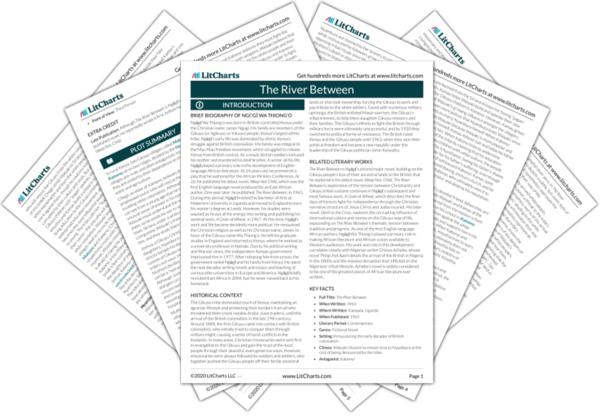The Honia river represents the ideological division between the neighboring villages Makuyu and Kameno. The river flows between both villages, dividing the ridges and keeping the people physically separated from each other. This separation reflects their deeper ideological division—Kameno advocates for tribalism while Makuyu embraces the white people’s Christianity. In fact, the river itself is where some of these core cultural and religious differences play out: it is where the tribalists perform their circumcisions and the Christians perform their baptisms.
However, despite the division that the river represents, it also symbolizes how the two villages are linked and even interdependent on one another. Both Makuyu and Kameno depend on the river for sustenance—watering their crops and animals—so if the river dries up, both villages will die out. Because the river is so central to the villages’ livelihood, it also plays an important social role in both societies, as it’s the primary meeting place for both. The river also takes on a spiritual significance for both villages, which use the river as a ceremonial site. In other words, the river reflects the common ground that people from both villages share, since they are all Gikuyu people. Just as Makuyu and Kameno are interlinked by their dependence on the river for agriculture and spiritual practice, their fates before the white people are interlinked as well. Either both villages stand against the colonists or both will be overrun, leading Waiyaki to recognize that the two villages must symbolically cross the river—overcome their ideological divisions—and “reconcile [their] antagonisms.”
The Honia River Quotes in The River Between
Nyambura was not circumcised. But this was not a crime. Something passed between them as two human beings, untainted with religion, social conventions, or any tradition.
The land was now silent. The two ridges lay side by side, hidden in the darkness. And Honia river went on flowing between them, down through the valley of life, its beat rising above the sark stillness, reaching into the heart of the people of Makuyu and Kameno.












